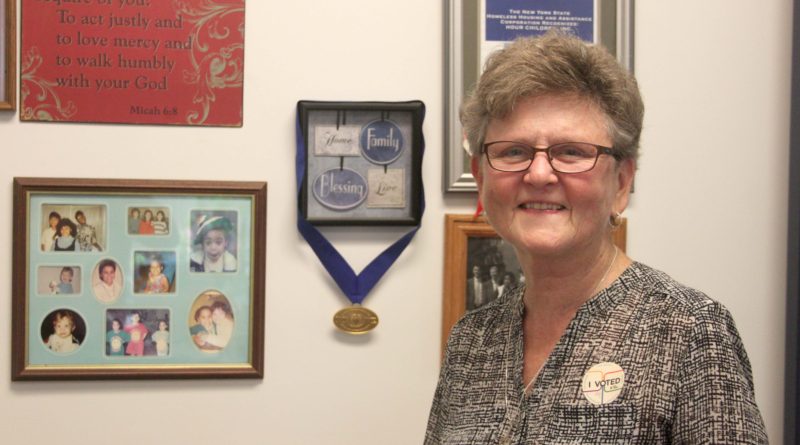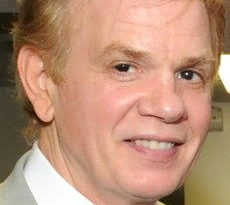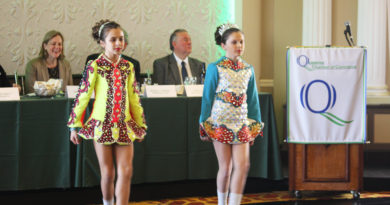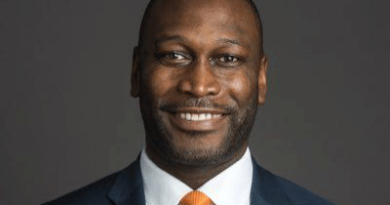Business Person of the Year 2018 Honoree: Sister Tesa Fitzgerald
The name Hour Children acknowledges the impact of certain hours on children’s lives: the hour their mother was arrested, the hour they visit, and the hour of their mother’s release and eventual reunification.
Over the course of 25 years, Hour Children has grown into a community-based organization that seeks to meet every need for this specific population. Today, the nonprofit runs six communal homes and three apartment houses in Queens, all of which provide a home and services for formerly incarcerated families.
According to Fitzgerald, 13 more apartments are “on the horizon,” and the state has awarded them money to build another 13 “down the road.” Hour Children is also closing on a new supportive house in Richmond Hill.
Though housing is critical, the organization also runs nearly a dozen programs that grew out of the needs of the mothers.
Hour Children runs two thrift shops, which first opened after receiving an excess of donated clothes, shoes and accessories. Both shops, including a new location on Steinway Street, are staffed by the women, who gain employment experience and new skills for their resume.
The thrift shops also present an opportunity to share the nonprofit’s mission with the surrounding community, Fitzgerald said.
Hour Children runs a licensed daycare for 28 children. It has an after-school program and a summer camp, which just hosted 40 children last summer.
Fourteen years ago, Fitzgerald partnered with the New York Community Trust to start a food pantry because the area was considered a food desert. They serve meals three days a week, and serviced more than 9,000 families last year.
On Wednesdays, Hour Children serves as a site for the local Community Supported Agriculture (CSA) program, which connects organic farmers with local neighborhoods that need fresh produce.
The organization started a teen program two years ago. It runs two mentoring programs: one for children and another for formerly incarcerated women. In both programs, they recruit volunteers to get involved.
To help the women reenter the workforce, Hour Children has a job-training program, where they teach computer training, resume writing, interviewing and other soft skills.
The nonprofit works with local employers to provide internships. For example, they placed two participants with Boyce Technologies and six women with Con Edison.
“They really need a safe space to learn the skills they can get, especially if they’ve been there awhile,” Fitzgerald said. “We want to make sure the women have a livable wage and a career.”
For the women who want to pursue a degree, Hour Children partners with LaGuardia Community College and Queensborough Community College to help them enroll.
Each program is designed to address a different need, Fitzgerald said. They work with community institutions to provide these services and programs.
“We are a vital part of the fabric of this neighborhood,” she said. “People really know us and come to us. The women are proud to be part of it.
“They know that yes, they had done something wrong,” Fitzgerald added. “They owned it, they did time for it and now they want the opportunity to get on with their lives.”
Sister Tesa, as she’s commonly known, said the women she works with don’t have the opportunities she had growing up. Many didn’t have the same education or a sense of family structure.
“They didn’t have it, but they want that for their kids. They know, especially after the separation, that was a value they wanted to embrace,” she said. “You can’t do that unless you have support.”
After 25 years, Fitzgerald has learned a lot about the people she helps. They’re resilient, hard working and filled with hope. They believe in a better life for themselves, and work toward that goal constantly.
Inside their communal homes, after their children are in bed, the women often gather in their kitchens and talk about their days. They learn from each other and create a sense of community that they can rely on.
The bond continues, even for those who have achieved independence. Fitzgerald said at their Christmas parties, some of the women come back to give updates on their lives and act as role models.
“The power of lived example is really important for the wonderful women I work with,” she said.




